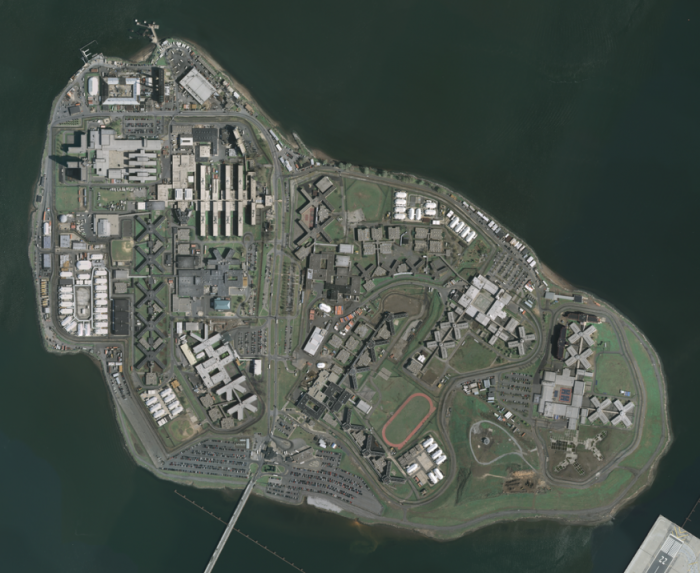
Aerial photo of Rikers jail complex (NYCDOC)
By Rachel Holiday Smith and Reuven Blau, THE CITY
This story was originally published on 8/12/20 by THE CITY
The city’s latest funding plan strips more than $500 million from construction of four new jails — with a building timeline that could extend two years past Mayor Bill de Blasio’s pledge to shut Rikers Island by 2026.
The capital budget commitment plan, published by the Office of Management and Budget last month, outlines $8.16 billion over 10 years for the “Borough-Based Jail” plan, which seeks to build new state-of-the-art correctional facilities in every borough except Staten Island.
That figure is down by about $520 million from $8.68 billion allocated in April.
“The city should be speeding up, not slowing down, the closure of the dysfunctional jails on Rikers,” said former Chief Judge Jonathan Lippman, who led a panel that called for the closing of Rikers.
He argued that the need to close the jails complex by the East River “has only grown more urgent” during the pandemic, which has “sharpened focus on racial equity.”
The city’s latest financial documents detail a timeline that wraps up two years after the original 2026 target end date.
The latest budget documents say construction should be complete by fiscal year 2028, which ends that June.
That fiscal year does still encompass the already delayed end date of August 2027, which surfaced with a revised City Hall timeline. But the timeline would allow construction to carry into the 2028 calendar year.
Billions for Lockups
An analysis of the November budget plan completed by the office of City Comptroller Scott Stringer and obtained by THE CITY confirmed the funding and timeline changes.
The budget also for the first time included figures for how much each of the planned jail facilities is projected to cost per borough.
The facility on White Street in Downtown Manhattan will cost an estimated $2.13 billion; in Queens, a new jail and a garage are expected to cost $1.95 billion and $92 million, respectively; in Brooklyn, $1.97 billion, and in The Bronx, $1.82 billion.
B. Colby Hamilton, a spokesperson for the Mayor’s Office of Criminal Justice, said the timeline shift is “due to the impact of COVID-19.” The budget changes, he added, are a “reflection of refinements to the building program,” such as reduced parking spaces.
“They do not impact programmatic space or plans for housing areas,” he said.

Ben Fractenberg/THE CITY
The de Blasio administration’s former top official leading the plan to close Rikers acknowledged the pandemic caused “some real issues and delays,” but downplayed the extended timeframe.
“I don’t think it signals anything negative about the intent to go forward with a plan,” said Liz Glazer, who stepped down as director of the Office of Criminal Justice in October.
The pandemic delayed plans to issue requests for proposals (RFPs) on how to proceed at the Manhattan site, she noted, but City Hall is keen on moving forward.
“I think there’s a lot of eagerness to make sure that the RFPs are out the door, that we get the bids and that the plan is well on its way before the mayor leaves,” she said.
‘Money That’s Wasted’
Activists and advocates, many of them relatives of formerly incarcerated people or former inmates themselves, have pushed for years to close Rikers Island’s jails.
They note it takes hours to travel to courts across the five boroughs, and detainees often have to be up by 3 a.m. for the arduous trips. It is also difficult for loved ones to access the island with just one bus line. Additionally, the facilities on Rikers are aging and have been neglected for years. Some lack air conditioning and others have busted cell doors and crumbling walls and floors.
Those who want the new jails plan stopped, however, see the delays as further evidence of what they view as a flawed undertaking.
Jan Lee, co-founder of Neighbors United Below Canal and a Chinatown activist who has led the charge to sue the city over the proposed White Street jail, said the latest lag and funding cuts leave many unanswered questions.
“When you’re scaling back in the hundreds of millions of dollars, you’re not just talking about a different paint color on the wall. You’re talking about something drastic,” he said. “How do you cut hundreds of millions of dollars out of a physical structure? Where’s it coming from?”
Lee’s group and other Chinatown locals won the first round in their lawsuit fighting the plans for the new jail in September when a judge declared environmental and land use approvals for the facility invalid. City Hall has appealed that decision, while Neighbors United is figuring out how to press the legal fight.
Lee urged the city to drop the case — and the jail plan altogether.
“They keep pushing the project back,” he said. “That being the case, if you don’t have faith in moving this forward in the next few years, don’t make us fight as a community. Don’t put us through this appeal process. It’s money that’s wasted.”
THE CITY is an independent, nonprofit news outlet dedicated to hard-hitting reporting that serves the people of New York.
